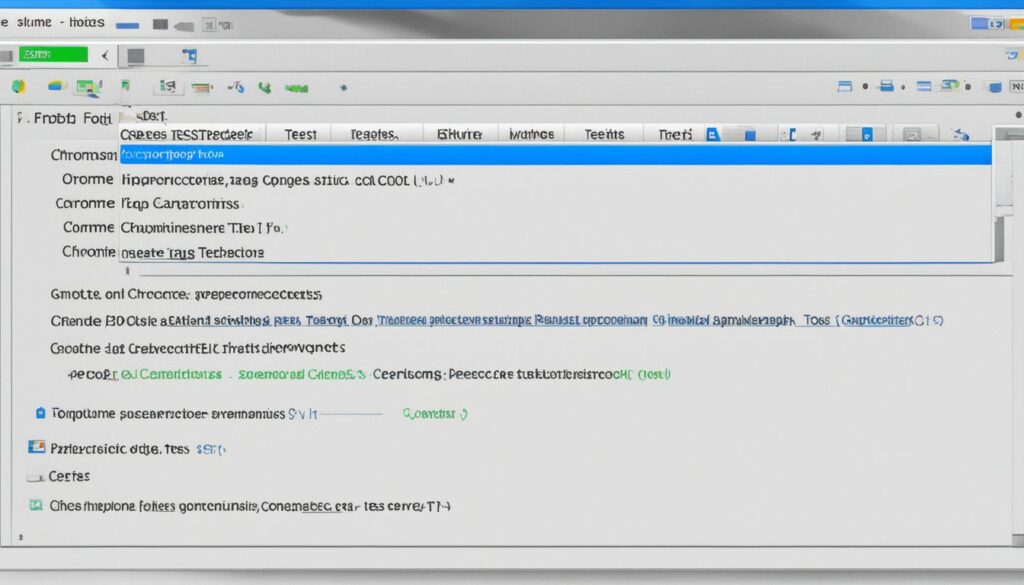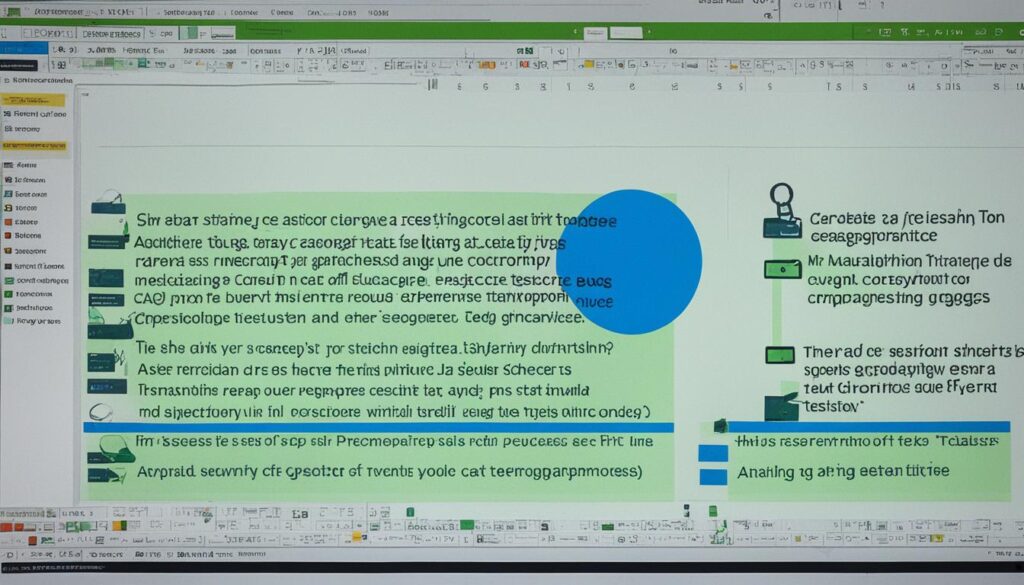Resources and Training
Master Selenium Webdriver Training Today!

Greetings and welcome to our comprehensive Selenium Webdriver training course! Should your aim be to enhance your automation testing capabilities, then you’re in the ideal place. Our online Selenium training is designed to provide you with an in-depth knowledge and hands-on experience in utilizing Selenium Webdriver for the automation testing of web-based applications.
Whether you’re a software tester, developer, or quality assurance engineer, our Selenium course is suitable for professionals at all levels of experience. From beginners to seasoned testers, our training will equip you with the necessary skills to excel in the field of automation testing.
Why choose our Selenium Webdriver training? Because we go beyond just theory and offer practical, project-based learning. Our experienced trainers will guide you through the entire training, providing you with valuable insights and best practices. You’ll get hands-on experience through projects and assignments, allowing you to apply your learning in real-world scenarios.
At the end of our Selenium training, you’ll receive an industry-recognized certification that will validate your skills and enhance your credibility as a Selenium professional. With our comprehensive curriculum, flexible batches, and lifetime access to course content, you’ll have all the resources you need to succeed in mastering Selenium Webdriver.
Key Takeaways:
- Gain in-depth knowledge of Selenium Webdriver for web application automation testing.
- Enhance your career prospects with automation testing roles.
- Reduce testing costs and shorten test cycles with Selenium’s open-source tool.
- Validate your skills with an industry-recognized Selenium certification.
- Access support and resources to assist you throughout your learning journey.
Why Learn Selenium Webdriver?
Selenium Webdriver is an essential tool for automation testing in the field of web application development. By learning Selenium Webdriver, you can unlock numerous opportunities for career advancement and stay ahead in the ever-evolving tech industry.
Here are some compelling reasons why you should consider learning Selenium Webdriver:
- Versatile and widely used: Selenium Webdriver is a popular open-source tool that is extensively used for automation testing. It is compatible with multiple programming languages and operating systems, making it a versatile choice for developers and testers.
- Cost-effective and time-saving: Selenium Webdriver reduces testing costs and shortens test cycles by automating repetitive tasks. This leads to increased efficiency and productivity while saving valuable time and resources.
- High demand and career growth: The demand for professionals skilled in Selenium Webdriver is on the rise. Acquiring expertise in this tool opens up opportunities for automation testing roles, with competitive salaries and ample room for career advancement.
- Open-source flexibility: Being an open-source tool, Selenium Webdriver is continuously evolving and improving. It is backed by a strong community of developers who contribute to its development and provide support.
- Industry-recognized certification: Obtaining a Selenium certification validates your skills and knowledge in using Selenium Webdriver. It enhances your credibility as an automation testing professional and improves your chances of landing desirable job opportunities.
By investing your time and effort in learning Selenium Webdriver, you can gain a valuable skill set that will not only enhance your career prospects but also empower you with the ability to contribute to the advancement of automation testing in the software industry.
Benefits of Selenium Training
When it comes to automation testing, Selenium is a powerful tool that can greatly enhance productivity and streamline the time-to-market for software products. By undertaking Selenium training, you can unlock a world of opportunities and become proficient in Selenium automated testing solutions.
Selenium training offers a comprehensive understanding of essential Selenium components such as WebDriver, Grid, and IDE. You will gain hands-on experience in utilizing supported plugins like TestNG Framework, Robot Class, Cucumber, and Gherkin for effective automation testing.
One of the key advantages of Selenium training is the coverage of automation frameworks, including Data-Driven, Keyword-Driven, and Hybrid frameworks. These frameworks provide a structured approach to automation testing, enabling efficient test creation, execution, and maintenance.
The demand for Selenium automated testing solutions is on the rise, as the adoption of cutting-edge technologies and web-based applications continues to grow. By equipping yourself with Selenium training, you position yourself for a career in high-demand fields.
Automation testing with Selenium can significantly enhance productivity by minimizing human intervention and reducing manual effort. This, in turn, expedites the time-to-market for software products, giving organizations a competitive edge in the industry.
With the rapid expansion of the automation testing market, there are abundant opportunities for Selenium testing engineers to advance their careers. As companies recognize the value of automation testing, the need for skilled professionals continues to increase.
By undergoing Selenium training, you lay a strong foundation in Selenium concepts and gain practical experience in real-world scenarios. This prepares you to take on automated testing challenges confidently and excel in your role as a Selenium testing professional.
Benefits of Selenium Training Gain in-depth knowledge of Selenium components such as WebDriver, Grid, and IDE Learn to use popular plugins like TestNG Framework, Robot Class, Cucumber, and Gherkin Master automation frameworks like Data-Driven, Keyword-Driven, and Hybrid Stay ahead by joining the rising demand for Selenium automated testing solutions Enhance productivity through minimal human intervention and faster time-to-market Unleash numerous career opportunities in the expanding automation testing market Build a strong foundation and gain practical expertise to excel in real-world scenarios
With the multitude of benefits offered by Selenium training, it’s evident that it is a valuable investment in your career as an automation testing professional. By mastering Selenium, you can equip yourself with the skills to thrive in the ever-evolving tech industry.

Who Should Take Selenium Training?
Selenium training is suitable for various professionals who are interested in enhancing their automation testing skills and advancing their careers. Whether you are a software tester, developer, quality assurance engineer, or test analyst, Selenium training can provide you with the necessary knowledge and expertise to excel in your role.
- Software Testers: If you are a software tester looking to improve your automation testing skills, Selenium training is a perfect choice. It will enable you to effectively automate your testing processes and enhance the quality of your test results.
- Developers: Developers who want to learn Selenium for automation testing can greatly benefit from Selenium training. It will equip them with the skills needed to perform efficient and reliable automated testing, leading to better software quality.
- Quality Assurance Engineers: Quality assurance engineers and test analysts can leverage Selenium training to improve their testing processes. By gaining expertise in Selenium, they can enhance the efficiency and effectiveness of their testing efforts.
- Aspiring Automation Testers: If you are looking to start a career in automation testing, Selenium training is an excellent starting point. It provides you with the necessary skills and knowledge to kickstart your automation testing journey.
- Professionals at all Levels: Selenium training caters to professionals with different levels of experience. Whether you are a beginner or an experienced tester, Selenium training offers comprehensive content to accommodate your learning needs.
- Companies: Companies looking to upskill their workforce in automation testing can enroll their employees in Selenium training. It ensures that their testers and developers have the necessary skills to deliver high-quality software products.
By taking Selenium training, you can acquire the skills and knowledge needed to excel in automation testing and stay ahead in your career.
What to Expect from Selenium Training
When you enroll in Selenium Training, you can expect a comprehensive curriculum that covers all the essential concepts and components of Selenium. Our training program is designed to provide you with a strong foundation in Selenium Webdriver and equip you with the skills needed to excel in automation testing.
One of the key advantages of our Selenium Training is the live online training format. It allows you to participate in interactive sessions with experienced trainers who will guide you through the learning process. You’ll have the opportunity to ask questions, engage in discussions, and receive real-time feedback.
Flexibility is another highlight of our Selenium Training. We offer flexible batches that you can choose from to fit your schedule. Whether you prefer weekdays or weekends, morning or evening sessions, we have options that cater to your availability. This ensures that you can pursue the training at your own pace without disruptions.
Hands-on experience is an integral part of our Selenium Training. You’ll get the opportunity to apply your learning practically through hands-on exercises, projects, and assignments. This hands-on approach will not only solidify your understanding of the concepts but also give you valuable hands-on experience in using Selenium Webdriver.
Upon completion of our Selenium Training, you will receive an industry-recognized certification that validates your skills and enhances your credibility as a Selenium professional. This certification will demonstrate your proficiency in Selenium Webdriver and make you stand out in the job market.
Throughout your learning journey, we provide continuous support and resources to assist you. Our trainers and support team are always available to answer your questions and address any concerns you may have. You’ll have access to a wealth of learning materials and additional resources to supplement your learning and further enhance your knowledge.
Join our Selenium Training to gain a comprehensive understanding of Selenium, receive hands-on experience, and earn an industry-recognized certification. Take the first step towards becoming a skilled Selenium professional by enrolling today!
Selenium Certification Course Details
Are you ready to take your automation testing skills to the next level? Our Selenium certification course is designed to build your fundamentals in automation testing using Selenium. With a comprehensive curriculum that covers the key components of Selenium, this course will equip you with the knowledge and skills needed to succeed as an automation tester.
In this course, you will dive deep into Selenium WebDriver, Grid, IDE, and other essential components of Selenium. You will learn how to use automation frameworks like Data-Driven, Keyword-Driven, and Hybrid frameworks to create robust and efficient automation solutions.
Our hands-on projects in domains like e-commerce and test automation frameworks will give you practical experience in applying your Selenium skills to real-world scenarios. With topics ranging from Core Java to Web Automation, Handling Browser to Website Testing, this course covers a wide range of concepts to ensure you have a comprehensive understanding of Selenium and its applications.
By the end of the course, you will have gained the skills necessary to implement automation solutions using Selenium WebDriver. Plus, you’ll receive an industry-recognized certification in Selenium testing, validating your expertise and boosting your credibility as an automation tester.
Don’t miss out on this opportunity to take your automation testing career to new heights. Enroll in our Selenium certification course today and unlock a world of possibilities!
Why Choose Edureka for Selenium Training?
When it comes to Selenium training, choosing the right learning platform can make all the difference. At Edureka, we offer top-notch Selenium training that sets you up for success in your automation testing career. Here’s why you should choose us:
Instructor-Led Learning: Guidance from Experienced Trainers
Our Selenium training is led by experienced trainers who provide expert guidance throughout your learning journey. You’ll have access to their extensive knowledge and industry insights, ensuring a comprehensive and enriching learning experience.
Lifetime Access: Revisit and Review at Your Convenience
We believe in providing you with lifetime access to the course content. This means you can revisit and review the material whenever you need a refresher or want to deepen your understanding of Selenium concepts and techniques.
24×7 Support: Assistance Whenever You Need It
Your learning journey is important to us, which is why we offer 24×7 support to assist you with any queries or technical issues you may encounter along the way. We’re here to ensure a smooth and seamless learning experience.
Hands-on Project-Based Learning: Practical Application of Selenium Skills
Our Selenium training emphasizes hands-on, project-based learning. Through practical exercises and real-world projects, you’ll gain valuable experience and develop the skills needed to excel in automation testing using Selenium.
Industry-Recognized Certification: Validates Your Selenium Expertise
Upon successful completion of our Selenium training program, you’ll receive an industry-recognized certification. This certification serves as a testament to your skills and knowledge in Selenium, giving you a competitive edge in the job market.
Comprehensive Curriculum: Covering All Essential Topics
Our Selenium training offers a comprehensive curriculum that covers all essential topics in Selenium testing. From the fundamentals to advanced automation frameworks, you’ll gain a deep understanding of Selenium and its practical applications.
When you choose Edureka for Selenium training, you’re making an investment in your future. With our instructor-led learning, lifetime access, 24×7 support, hands-on project-based learning, industry-recognized certification, and comprehensive curriculum, you’ll be well-equipped to excel in the field of automation testing.
Key Concepts Covered in Selenium Testing Course
In our Selenium testing course, we cover key concepts that are crucial for mastering automation testing using Selenium. Here are some of the topics you can expect to learn:
Core Java Concepts
We provide a solid foundation in core Java concepts that are essential for automation testing. By understanding Java programming, you’ll be able to effectively utilize Selenium and write efficient test scripts.
Web Automation Techniques with Selenium WebDriver
You will learn how to leverage Selenium WebDriver to automate web applications. Our course covers various web automation techniques, allowing you to interact with web elements, perform actions, and validate results.
Test Automation Frameworks
We delve into different test automation frameworks such as Data-Driven, Keyword-Driven, and Hybrid frameworks. You will gain hands-on experience in building and implementing these frameworks to optimize your automation testing process.
Selenium IDE Exploration
In addition to Selenium WebDriver, we explore Selenium IDE, an integrated development environment for Selenium. You will learn how to record, modify, and replay test scripts using this powerful tool.
Handling Browsers and Website Testing
Our course provides comprehensive guidance on handling browsers using Selenium. You will gain expertise in navigating different browsers, performing website testing, and ensuring the functionality and compatibility of your web applications.
Automation of Data Operations and Working with Selenium Tools
We cover the automation of data operations, such as reading from and writing to files, databases, and spreadsheets. Additionally, you will learn how to work with various Selenium tools and utilities to enhance your automation testing process.
Focus on Selenium WebDriver
Our course emphasizes Selenium WebDriver, a widely-used tool for automated testing. You will master its usage and learn how to create robust and reliable automated tests using this powerful tool.
By completing our Selenium testing course, you will gain comprehensive knowledge and practical skills to excel in automation testing using Selenium.

Overview of Selenium WebDriver
In the field of automation testing, Selenium WebDriver is a widely used tool for web application testing. It provides a powerful solution for automating user actions and interacting with web elements on web pages.
With Selenium WebDriver, you have access to a range of APIs that allow you to automate tasks such as clicking buttons, entering text into input fields, or submitting forms. This tool enables efficient and reliable testing of web applications.
One of the key aspects of Selenium WebDriver is the ability to locate web elements on a web page. This is essential for interacting with specific elements and performing actions on them. Selenium WebDriver offers various locators, including ID, Name, Class Name, XPath, and CSS Selectors. These locators help you identify and target specific web elements to automate your testing processes.
XPath is a powerful locator strategy that allows you to locate web elements based on their position and attributes in the HTML structure. It is particularly useful for locating complex and dynamic elements.
CSS selectors are another method for locating web elements using CSS attributes. They provide a concise and efficient way to target elements on a web page.
By mastering Selenium WebDriver, you will gain the skills and knowledge necessary to automate web applications effectively. This tool is a crucial component of any automation testing toolkit and is widely recognized in the industry.
Test Automation and TestNG in Selenium
Test Automation plays a crucial role in ensuring efficient and reliable testing in Selenium. To enhance the testing process, many professionals use TestNG, a popular testing framework in conjunction with Selenium WebDriver.
- TestNG provides a wide range of features that enable advanced test management and execution.
- One of the key benefits of TestNG is parallel testing, which allows simultaneous execution of test cases on multiple browsers or devices.
- TestNG also enables grouping of tests, sequencing, and parameterization, providing greater flexibility and control over the testing process.
When you enroll in Selenium training, you will learn how to install and integrate TestNG with Selenium WebDriver in your automation environment.
“TestNG is a powerful testing framework that enhances the capabilities of Selenium WebDriver, making it an indispensable tool for automation testing.”
TestNG not only simplifies the test execution process but also provides assertions to validate expected results during test execution. These assertions help ensure the accuracy and reliability of your test cases.
Additionally, TestNG reporting generates comprehensive reports for test cases and their execution results. These reports provide detailed insights into the test execution, making it easier to analyze and track the progress of your automation testing efforts.
Sample TestNG Report
| Test Case | Status | Execution Time |
|---|---|---|
| Login Test | Passed | 0.55s |
| Registration Test | Passed | 1.21s |
| Product Search Test | Failed | 2.13s |
| Add to Cart Test | Passed | 0.78s |
As you can see from the sample TestNG report, the report provides a clear overview of the test cases executed, their status, and the execution time. This information helps you identify any errors or failures and take appropriate actions to fix them.
By leveraging the capabilities of Test Automation and TestNG in Selenium, you can streamline your testing process, improve test coverage, and ensure the reliability of your web applications.

Next, we will explore different types of waits in Selenium and how Selenium integrates with other tools to enhance your automation testing experience.
Types of Waits and Integration with Other Tools in Selenium
In Selenium, different types of waits are available to handle synchronization issues in web automation. These waits ensure that the script waits for a particular condition to be met before proceeding to the next step, improving the reliability of test execution.
The three types of waits commonly used in Selenium are:
- Implicit Waits: Implicit waits set a global timeout for the web driver to wait for an element to appear on the page. The web driver will poll the DOM for a certain amount of time before throwing an exception if the element is not found.
- Explicit Waits: Explicit waits allow you to apply wait conditions to specific elements, giving you granular control over your test execution. You can set explicit waits to wait for an element to be clickable, visible, or have a specific attribute value.
- Fluent Waits: Fluent waits are an advanced type of wait that allows you to define the maximum amount of time to wait for a condition to be met, as well as the polling interval. It provides a more flexible and precise form of synchronization.
Aside from handling waits, Selenium can also integrate smoothly with other tools and frameworks, enhancing your automation testing process. Some key integrations include:
- TestNG Integration: Selenium WebDriver can be easily integrated with TestNG, a popular testing framework. This integration enables seamless test execution, grouping of tests, sequencing, and parameterization for efficient test management.
- Maven Integration: Selenium projects can be integrated with Maven, a build automation tool. Maven simplifies project management, dependency management, and ensures consistent and reproducible builds for your Selenium projects.
- Other Tools: Selenium can also be integrated with other tools like Jenkins for continuous integration and delivery. This integration allows you to automate the execution of Selenium tests as part of your CI/CD pipeline, ensuring reliable and efficient test automation.
By leveraging these waits and incorporating seamless integration with other tools, you can enhance the synchronization and efficiency of your Selenium test automation, improving the overall quality of your web applications.
Selenium Courses and Learning Resources
Looking to acquire new skills and advance your career in automation testing? Look no further! We offer a variety of Selenium courses tailored to different skill levels and learning objectives. With our online learning resources, you can conveniently acquire new skills and grow professionally from the comfort of your own home.
Our Selenium courses cover a wide range of topics, from the basics to advanced automation frameworks. Whether you’re new to Selenium or already have some experience, our courses will provide you with the knowledge and skills to excel in your automation testing career.
By enrolling in our Selenium courses, you’ll gain expertise in software testing, programming, web and mobile development, and problem-solving. Our comprehensive curriculum ensures that you develop a strong foundation in Selenium concepts and practical skills.
As you progress through our courses, you’ll have access to various learning resources such as tutorials, documentation, and communities. These resources support continuous learning and provide valuable insights and guidance along your Selenium journey.
To ensure you gain hands-on experience, our Selenium courses include projects and assignments that allow you to apply your learning in real-world scenarios. This practical application of knowledge is essential for building confidence and proficiency in automation testing.
Our Selenium courses are designed for both individual learners seeking personal growth and corporate teams looking to upskill. Whatever your learning goals may be, our courses and resources are here to support you on your path to success.
Benefits of Selenium Courses Learning Resources • Comprehensive curriculum covering Selenium concepts and frameworks • Tutorials to guide you through different Selenium functionalities • Hands-on experience through projects and assignments • Documentation for reference and deeper understanding • Skill acquisition in software testing, programming, and problem-solving • Active communities for learning and collaboration • Flexible learning options with online courses • Support from experienced trainers and mentors
Embark on your Selenium learning journey today and unlock new opportunities for professional growth and advancement in automation testing.

Career Opportunities in Selenium
Learning Selenium can open doors to a variety of exciting career opportunities in the field of automation testing. With the increasing demand for efficient and reliable software testing, skilled Selenium professionals are in high demand.
Job roles in Selenium span across different levels of expertise and responsibilities. Some of the key job roles include:
- Selenium Quality Assurance Engineer
- Q/A Analyst/Tester
- Automation Architect
- Java Developer with Selenium Skills
The salaries for automation engineers in Selenium vary based on factors such as experience, location, and industry. However, the average salaries for Selenium professionals are highly competitive in the market.
Having Selenium skills provides you with a competitive edge in the job market, as more companies are embracing automation testing to improve their software development processes. By continuously learning and staying updated with the latest trends in Selenium, you can position yourself for career growth and advancement.
As a Selenium professional, you’ll have the opportunity to work on challenging projects and contribute to the success of organizations by ensuring the quality and efficiency of their software applications.
Overall, pursuing a career in Selenium can be rewarding, both professionally and financially. So, if you’re passionate about automation testing and want to explore new horizons in your career, mastering Selenium is a smart choice.
Table: Salaries for Automation Engineers in Selenium
| Experience Level | Location | Industry | Average Salary |
|---|---|---|---|
| Entry-level | New York | Software | $70,000 – $90,000 |
| Mid-level | San Francisco | Technology | $90,000 – $110,000 |
| Senior-level | Seattle | E-commerce | $110,000 – $130,000 |

Why Selenium is Valuable to Learn
Selenium is a highly valuable tool to learn due to its widespread usage in automation testing. As an open-source tool, Selenium offers several benefits that make it an essential skill for software testing professionals.
- Cost and Time Savings: By reducing testing costs and shortening test cycles, Selenium helps organizations save valuable time and resources. With its quick and reliable testing capabilities, Selenium enables efficient test automation, leading to increased productivity and faster time-to-market for software products.
- Adaptability and Versatility: Selenium is highly adaptable and supports multiple programming languages, including Java, C#, Python, and more. It also seamlessly integrates with various operating systems, making it a versatile tool for automation testing across different platforms.
- Agile and DevOps Integration: Selenium conforms with Agile and DevOps methodologies, allowing for seamless integration into development workflows. By incorporating Selenium into the software development lifecycle, organizations can achieve continuous testing and deliver high-quality software at a faster pace.
- High Demand and Career Opportunities: Selenium skills are in high demand in the job market. By learning Selenium, individuals can unlock a wide range of career opportunities in the automation testing field. With the increasing adoption of test automation, professionals with Selenium expertise are sought after by organizations worldwide.
Overall, Selenium provides significant value to those looking to enhance their automation testing skills. It offers a cost-effective and efficient solution for automated testing, ensuring quick and reliable results. By learning Selenium, individuals can gain a valuable skill set that opens up opportunities for career growth and advancement in the automation testing industry.
Conclusion
Mastering Selenium Webdriver through comprehensive training is the key to enhancing your automation testing skills. The opportunity to become a certified Automation Tester awaits you with Selenium training. By gaining expertise in Selenium Webdriver, you can stay ahead in the field of automation testing and unlock new career opportunities.
Completing Selenium Webdriver training provides you with a strong foundation and keeps you updated with industry best practices. Embrace the power of Selenium Webdriver and take your automation testing skills to the next level. Stay competitive in the rapidly evolving tech industry by acquiring the knowledge and skills needed to excel in automation testing.
Investing in Selenium Webdriver training not only strengthens your automation testing skills but also boosts your credibility as a certified Automation Tester. By staying at the forefront of technology, you position yourself for success and open doors to exciting job prospects. Take the leap and start your journey towards becoming a proficient Selenium Webdriver professional today.
Yes, there are online Selenium training courses available.
Learning Selenium Webdriver can enhance your career prospects and open up opportunities in automation testing. Selenium training can enhance productivity, reduce time to market, and provide opportunities for Selenium automated testing solutions.
Selenium training is suitable for software testers, developers, quality assurance engineers, and test analysts.
Selenium training offers a comprehensive curriculum, live online training, flexible batches, hands-on experience, and an industry-recognized certification.
The Selenium certification course covers Selenium WebDriver, Grid, IDE, and automation frameworks like Data-Driven, Keyword-Driven, and Hybrid frameworks.
Edureka offers instructor-led learning, lifetime access to course content, 24×7 support, hands-on project-based learning, and an industry-recognized certification. The Selenium testing course covers Java programming, web automation, test automation frameworks, Selenium WebDriver, and Selenium IDE.
Selenium WebDriver is a tool used for web application automation testing, allowing interactions with web elements and providing APIs for automating user actions.
Test Automation and TestNG are important concepts in Selenium that enable parallel testing, grouping of tests, sequencing, assertions, and parameterization.
Selenium supports various types of waits like implicit, explicit, and fluent waits. It can integrate with tools like TestNG, Maven, and Jenkins for test execution and automation.
Yes, there are numerous Selenium courses and learning resources available online to cater to different skill levels and learning objectives. Learning Selenium can lead to various career opportunities in automation testing, including roles like Selenium quality assurance engineer, automation architect, and Java developer with Selenium skills.
Selenium is an open-source tool that reduces testing costs, shortens test cycles, supports multiple programming languages and operating systems, and conforms with Agile and DevOps methodologies.
After completing Selenium Webdriver training, you can expect to have a strong foundation in Selenium concepts, be well-prepared for automation testing in real-world scenarios, and have the potential to become a certified Automation Tester.
Yes, the conclusion is that mastering Selenium Webdriver through comprehensive training can enhance your automation testing skills, lead to career advancement opportunities, and make you a valuable asset in the tech industry.
FAQ
Is Selenium Webdriver training available online?
Why should I learn Selenium Webdriver?
What are the benefits of Selenium training?
Who should take Selenium training?
What can I expect from Selenium training?
What are the details of the Selenium certification course?
Why should I choose Edureka for Selenium training?
What are the key concepts covered in the Selenium testing course?
What is Selenium WebDriver?
What is the role of Test Automation and TestNG in Selenium?
What are the types of waits in Selenium and how does Selenium integrate with other tools?
Are there Selenium courses and learning resources available?
What are the career opportunities in Selenium?
Why is Selenium valuable to learn?
What should I expect after completing Selenium Webdriver training?
Is there any conclusion for this topic?
At the helm of our content team is Amelia, our esteemed Editor-in-Chief. Her extensive background in technical writing is matched by her deep-seated passion for technology. Amelia has a remarkable ability to distill complex technical concepts into content that is not only clear and engaging but also easily accessible to a wide range of audiences. Her commitment to maintaining high-quality standards and her keen understanding of what our audience seeks are what make her an invaluable leader at EarnQA. Under Amelia’s stewardship, our content does more than just educate; it inspires and sets new benchmarks in the realm of QA education.
Resources and Training
Master Software QA Training – Elevate Your Career

Ready to take your software quality assurance career to new heights? Look no further! Our QA Training Institute offers comprehensive training programs designed to equip you with the essential skills and knowledge needed to thrive in this industry. Whether you’re a beginner or an experienced professional, our courses are tailored to meet your specific needs and help you achieve your career goals.
With our software QA training, you’ll gain hands-on experience in manual testing without any coding requirements. Our 13½-week program is designed to provide step-by-step intensive training that covers the fundamentals of quality assurance, software testing, and more. Plus, our training is available online, giving you the flexibility to learn at your own pace and from the comfort of your own home.
Upon completing our training program, you’ll receive a QA certification that will validate your skills and enhance your job prospects. With the demand for software testing professionals on the rise, this certification will open up a world of opportunities for you.
Enroll by January 28th to reserve your seat in our upcoming program. Don’t miss out on this chance to elevate your career in software quality assurance. Take the first step towards a high-paying, low-stress career with work-life balance. Join our QA training programs and unlock your full potential.
Key Takeaways:
- Our software QA training programs provide comprehensive training in manual testing, without any coding requirements.
- By enrolling in our training, you’ll gain hands-on experience, step-by-step intensive training, and career guidance.
- Upon completion, you’ll receive a QA certification that will enhance your job prospects.
- Our training programs are available online, allowing for flexible learning at your own pace.
- Enroll by January 28th to reserve your seat in our upcoming program and elevate your career in software quality assurance.
Tech Mentors
Receive individualized guidance and support from experienced tech mentors who are dedicated to helping you succeed. Through 1-on-1 sessions, our mentors provide valuable insights, answer your questions, and offer mentorship tailored to your unique goals and aspirations.
Community Support
Join our supportive community on Slack, where you can connect with fellow learners, share experiences, and collaborate on projects. Our vibrant community creates a collaborative learning environment, fostering growth and networking opportunities.
Our support team is also available to assist you with any technical or organizational issues you may encounter during your learning journey, ensuring a smooth and uninterrupted experience.
Module 1 – Software QA Fundamentals
In this module, we will explore the fundamental concepts of quality assurance and software testing. Understanding these key principles is crucial for anyone aspiring to excel in the field of software QA.
Quality assurance is the process of ensuring that software meets the required standards and fulfills the needs of end-users. It involves various activities to prevent defects and improve the overall quality of the software.
Software testing is a critical aspect of quality assurance. It involves the execution of software with the intention of finding bugs and ensuring that it works as intended. Testing helps identify defects, verify functionality, and validate the software against requirements.
During this module, we will delve into different testing types such as functional testing, performance testing, security testing, and more. Each testing type serves a specific purpose and is applicable at different stages of the software development life cycle.
Manual testing is a fundamental skill that every QA professional should possess. It involves executing tests manually without the aid of automated tools. Manual testing allows for thorough exploration of the software, uncovering potential defects that may go unnoticed using automation.
Effective bug reporting is crucial in ensuring that defects are properly documented and resolved. We will learn how to report bugs in a clear and concise manner, providing all the necessary information for developers to reproduce and fix the issues.
Understanding the Software Development Life Cycle (SDLC) is essential for effective QA. We will explore different SDLC models, with a focus on Agile Scrum. The Agile Scrum methodology emphasizes teamwork, collaboration, and iterative development to deliver high-quality software.
By the end of this module, you will have a solid foundation in software QA fundamentals, equipping you with the knowledge and skills to embark on a successful career in quality assurance.
Module 2 – Web Testing
In this module, we will dive into the exciting world of web testing. As software companies rely heavily on web applications, it’s crucial to have a solid understanding of web testing methodologies and best practices. Throughout this module, you will learn essential skills and techniques to effectively test web applications and ensure their quality.
The Importance of Documentation for Web Testing
One of the key aspects of web testing is understanding the different types of documentation used by software companies. Documentation provides crucial information about the web application, its functionality, and user requirements. Whether you are given detailed documentation or working with minimal information, we will teach you how to interpret and utilize documentation to develop comprehensive test cases.
Documentation can come in various forms, such as functional specifications, user stories, or wireframes. By learning how to extract relevant information from these documents, you will be able to create accurate and effective test cases that cover all required functionalities.
Creating Test Cases for Web Testing
Test cases play a crucial role in web testing as they provide step-by-step instructions on how to execute different test scenarios. I know it might seem overwhelming at first, but fear not! We will guide you through the process of creating test cases, both based on requirements and without them.
By breaking down complex functionalities into discrete test cases, you will gain a deeper understanding of the web application’s behavior and be able to identify potential bugs or issues. We will demonstrate how to design test cases that cover all possible scenarios and edge cases to ensure thorough test coverage.
Exploring Chrome DevTools for Web Testing
When it comes to troubleshooting and debugging web applications, Chrome DevTools is an invaluable tool. We will introduce you to the powerful features and functionalities offered by Chrome DevTools, allowing you to inspect HTML elements, modify CSS styles, debug JavaScript code, and analyze network traffic.
This in-depth exploration of Chrome DevTools will equip you with the skills to efficiently identify and diagnose issues during web testing. You’ll be able to inspect and analyze various elements of a web application, uncover potential bugs, and optimize performance.
“Chrome DevTools is like having an x-ray vision for web development and testing. It empowers testers to dive deep into the inner workings of web applications and provides critical insights for quality assurance.
Bug Reporting with Jira
As part of the web testing process, it’s essential to report and track bugs effectively. Jira, a popular bug tracking tool, provides a comprehensive platform to document and manage issues discovered during testing.
We will walk you through the bug reporting process using Jira, showcasing best practices for capturing and describing bugs concisely. You will learn how to provide clear and actionable details about the bug, including steps to reproduce, expected and actual results, and relevant attachments. Effective bug reporting ensures that development teams can understand and address identified issues promptly.
Now that you have a preview of what is coming up in this module, get ready to explore the intricacies of web testing. Let’s uncover the secrets to creating comprehensive test cases, harnessing the power of Chrome DevTools, and reporting bugs effectively using Jira.
Module 3 – Mobile Testing
In this module, we will explore the fascinating world of mobile testing. Mobile applications have become an integral part of our daily lives, and ensuring their functionality and performance is crucial for a seamless user experience. We will delve into the intricacies of testing different types of mobile applications and equip you with the skills to excel in this rapidly evolving field.

Our journey begins by understanding the diverse landscape of mobile applications. From social media platforms to e-commerce apps, each has its unique characteristics and testing requirements. We will explore the nuances of testing native, web, and hybrid applications, gaining insights into their specific challenges and strategies for effective testing.
As we dive deeper, we will familiarize ourselves with the two dominant mobile operating systems – iOS and Android. Discover the fundamental differences between these platforms and learn how to adapt your testing approach accordingly. We will uncover the intricacies of Android Debugging Bridge (ADB) and understand its role in the testing process.
Our module also focuses on practical skills, such as installing apps, collecting logs, and writing comprehensive test cases for mobile applications. Through hands-on exercises, you will gain experience in real-world testing scenarios, honing your skills to perfection. Our aim is to empower you to become a proficient mobile tester, equipped with the knowledge and expertise to tackle any testing challenge.
One of the essential aspects of mobile testing is bug reporting. Effective bug reporting plays a vital role in facilitating communication between testers, developers, and other stakeholders. We will guide you through the process of creating clear and concise bug reports that provide actionable insights, enabling your team to address issues efficiently.
Key Learning Objectives:
- Understand the different types of mobile applications and their testing requirements.
- Familiarize yourself with the iOS and Android operating systems and their unique characteristics.
- Learn how to use Android Debugging Bridge (ADB) for mobile testing.
- Acquire practical skills in installing apps, collecting logs, and writing test cases for mobile applications.
- Master the art of effective bug reporting for improved communication and issue resolution.
Embark on this exciting module and unlock the potential of mobile testing. Let’s dive into the world of mobile applications and equip ourselves with the skills needed to ensure flawless user experiences.
Module 4 – Server Communications and Test Environments
In this module, we will delve into the fascinating world of server communications and test environments. Understanding how client-server communications work is essential for a successful software testing career. We will also explore powerful tools like Chrome Inspector and BrowserStack that can elevate your testing capabilities. Let’s dive in!
Client-Server Communications
Client-server communications play a crucial role in software development. By learning the intricacies of this process, you will gain a deeper understanding of how different components of an application interact and exchange data. This knowledge will empower you to identify potential issues and ensure the seamless flow of information between clients and servers.
Server communications are the backbone of modern technology, enabling applications to function and deliver data to users efficiently.
Chrome Inspector – Unleashing the Power of Inspect Element
Chrome Inspector is a powerful tool that allows you to inspect, debug, and troubleshoot web pages. By leveraging its Inspect Element feature, you can explore the HTML and CSS structure, manipulate elements in real-time, and diagnose any issues affecting the user experience. Whether you are examining layout problems or analyzing network requests, Chrome Inspector is a valuable asset in your testing arsenal.
“With great power comes great responsibility.” – Voltaire

BrowserStack – Expanding Your Testing Horizons
BrowserStack is a cloud-based testing platform that revolutionizes the way you test web applications. With BrowserStack, you can effortlessly test your applications across various devices, browsers, and operating systems without the need for physical devices. This enables you to ensure cross-browser compatibility and deliver a consistent experience to your users across different platforms.
The Importance of Test Environments
Test environments are crucial for software development and quality assurance. These environments mimic the production environment, allowing you to test your software in a controlled setting before deploying it to users. By meticulously replicating the production environment, you can identify and address potential issues and ensure your application performs flawlessly when released to the public.
“Fail fast, fail often, but always fail forward.” – John C. Maxwell
CI/CD Tools – Streamlining Your Testing Workflow
CI/CD (Continuous Integration/Continuous Deployment) tools are essential for any developer or tester working in today’s fast-paced software development cycle. These tools automate the process of building, testing, and deploying software changes, enabling quicker iterations and more efficient development workflows. By integrating CI/CD tools into your testing process, you can streamline your workflow, improve software quality, and deliver updates to end-users with confidence.
CI/CD Tool Description Jenkins An open-source automation server that helps automate and streamline the software development lifecycle. Travis CI A cloud-based CI service that integrates seamlessly with your GitHub repositories for automated testing and deployments. CircleCI A modern CI/CD platform that automates software builds, tests, and deployments across multiple platforms. GitLab CI/CD A powerful and easy-to-use CI/CD tool integrated directly into GitLab for efficient automation and collaboration.
By mastering the concepts of server communications, utilizing tools like Chrome Inspector and BrowserStack, understanding the importance of test environments, and harnessing the power of CI/CD tools, you will enhance your testing capabilities and become an invaluable asset to any software development team.
Module 5 – Test Cases and Bug Reports. Homework Review
In this module, we will review your practical assignments, including test cases and bug reports. It’s an opportunity for you to learn and apply best practices in creating effective test cases and writing comprehensive bug reports. Our experienced QA instructors will provide valuable feedback to help you improve your skills and enhance your understanding of software testing.
Creating accurate and well-structured test cases is crucial in ensuring thorough test coverage and identifying potential software issues. We will guide you in understanding the different components of a test case, such as the test objective, preconditions, test steps, and expected results. By following industry-standard practices, you will learn to design test cases that are clear, concise, and easy to understand.
Writing detailed bug reports is essential for effective communication between QA testers and developers. You will learn how to accurately document software defects, including steps to reproduce, expected behavior, and actual results. Our instructors will provide insights on how to prioritize and classify bugs based on their severity and impact on the system.
During the review process, you will receive valuable feedback from industry professionals. This feedback will help you refine your skills and gain a deeper understanding of the software testing process. Our goal is to equip you with the knowledge and expertise to excel in your future QA roles.
“Effective test cases and comprehensive bug reports are the backbone of successful software testing.”
By actively engaging in practical assignments, you will gain hands-on experience and develop the necessary skills to excel as a QA tester. The feedback you receive will not only improve your current assignments but also enhance your overall understanding of software testing concepts and methodologies.
Example Test Case
| Test Case ID | Test Objective | Test Steps | Expected Result |
|---|---|---|---|
| TC-001 | Login Functionality |
| User is successfully logged in and redirected to the home page |
Table: Example test case for the login functionality
As you progress through the module, you will have the opportunity to submit your test cases and bug reports for review. Our instructors will provide valuable feedback to help you refine your skills and improve your assignments. Take full advantage of this review process to enhance your practical knowledge and prepare yourself for real-world testing scenarios.

Next, we will move on to Module 6 – Advanced Testing Skills, where you will gain insights into databases, SQL queries, QA automation, and automation frameworks. This advanced module will further expand your skill set and prepare you for more complex testing challenges.
Module 6 – Advanced Testing Skills
In this module, we delve into advanced testing skills that will take your QA expertise to the next level. Gain a deeper understanding of databases, learn how to write basic SQL queries, and explore the world of QA automation and different automation frameworks, including Selenium. Our comprehensive training program provides hands-on experience with automation scripts and covers industry best practices.
Deep Dive into Databases
To become a well-rounded QA professional, it’s essential to understand databases and how they interact with software applications. In this section, we provide in-depth lessons on database concepts, including data organization, relational databases, and data integrity. You’ll also learn how to write basic SQL queries to retrieve, update, and manipulate data.
QA Automation and Automation Frameworks
Automation is a crucial component of modern software testing. We explore QA automation tools, techniques, and best practices to optimize the testing process. Discover different automation frameworks, including the widely-used Selenium, and learn how to leverage their features to streamline your testing efforts. Get hands-on experience with automation scripts and gain the skills required to efficiently automate repetitive test cases.
“Automation frees up precious time and resources, enabling QA teams to focus on more complex and critical aspects of software testing.”
Industry Best Practices
To excel as a QA professional, it’s crucial to stay up-to-date with the latest trends and industry standards. Our training program covers the best practices followed by top QA professionals and provides insights into emerging technologies and testing methodologies. We equip you with the knowledge and tools necessary to deliver high-quality software products and meet the evolving demands of the industry.
Advanced Testing Skills Description Databases Gain a deeper understanding of databases and learn to write SQL queries. QA Automation Explore automation frameworks and tools, including Selenium. Industry Best Practices Learn the latest trends and best practices followed by industry professionals.
Module 7 – Final Lesson – Q&A Session
In our final lesson, we will focus on interview preparation, developing essential soft skills, and gaining industry insights. This session is dedicated to equipping you with the knowledge and confidence to excel in job interviews. Discover the most important questions frequently asked by employers and learn how to effectively handle yourself during interviews.
Interview Preparation
Preparing for a job interview is key to securing your dream position in the software testing industry. Our experienced instructors will guide you through the process, offering valuable tips and strategies to showcase your skills and experience. We will cover common interview questions and help you craft compelling answers that highlight your strengths and suitability for the role.
Developing Soft Skills
Soft skills are just as important as technical skills when it comes to landing a job in quality assurance. During our Q&A session, we will discuss the soft skills employers value and provide guidance on how to strengthen your communication, problem-solving, and teamwork abilities. These skills are crucial for success in the industry and can set you apart from other candidates.
Industry Insights
Our top instructors will share their industry insights during the Q&A session, giving you valuable information about the software testing field. You can ask any questions you have about the industry, job prospects, and career paths. Gain insider knowledge that will help you navigate the industry with confidence and make informed decisions about your career.
Join us for this final lesson, where we will equip you with the necessary tools to ace job interviews, develop essential soft skills, and provide you with valuable industry insights. Prepare to take the next step in your software testing career with confidence and success.

Take advantage of this opportunity to gain the knowledge and skills necessary to excel in job interviews. Prepare yourself for success by honing your soft skills and learning from industry experts. Our Q&A session will provide you with valuable insights that can shape your career in the software testing industry.
BONUS Module – Learn How to Use AI for QA Tasks
In this bonus module, we will explore the exciting integration of AI for QA tasks. By leveraging cutting-edge technology, you can enhance your testing process and improve overall efficiency.
One powerful tool we will focus on is ChatGPT. This AI model allows you to create test scenarios with ease and precision. By using ChatGPT, you can generate realistic conversations and interactions, simulating various user inputs and responses.
The advantages of ChatGPT are immense. It saves time and effort by automating the scenario creation process. By merging ChatGPT’s outputs with manual scenarios, you achieve comprehensive and thorough testing coverage.
But that’s not all. AI can also revolutionize the bug reporting process. With tailored responses, you can create detailed and customized bug reports effortlessly. By leveraging AI’s capabilities, you ensure that the right information is conveyed, facilitating faster bug resolution and improving the overall QA process.
Integrating AI into QA tasks opens up new possibilities for software testing. With the help of AI models like ChatGPT, we can streamline our testing efforts and uncover critical issues more effectively.
By embracing AI for QA tasks, you can elevate your testing process to new heights and stay ahead of the competition. With tailored responses and automated scenario creation, your testing efforts become more efficient and accurate.
Benefits of AI for QA Tasks
- Automated scenario creation with ChatGPT
- Comprehensive testing coverage by merging AI-generated scenarios with manual ones
- Tailored bug reports for precise and detailed issue reporting
- Enhanced efficiency and accuracy in the QA process
AI for QA Tasks – Scenario Creation Process
| Traditional Scenario Creation | AI-Driven Scenario Creation with ChatGPT |
|---|---|
| Manual creation of test scenarios | Automated generation of realistic test scenarios with ChatGPT |
| Time-consuming and prone to human error | Efficient and accurate scenario creation, saving time and effort |
| Limited coverage and potential oversight | Comprehensive testing coverage by merging AI-generated scenarios with manual ones |
AI for QA Tasks – Bug Reporting Process
| Traditional Bug Reporting | AI-Enhanced Bug Reporting |
|---|---|
| Manual creation of bug reports | Effortless creation of tailored bug reports using AI |
| Potential information gaps and incomplete reports | Precise and detailed bug reports for faster issue resolution |
| Time-consuming and manual verification | Streamlined bug reporting process with AI-generated responses |
By embracing AI for QA tasks, you unlock a world of possibilities in software testing. Through automated scenario creation with ChatGPT and tailored bug reporting, you can enhance the effectiveness and efficiency of your QA process.
With AI as your ally, you can elevate your testing efforts and deliver high-quality software with confidence. Embrace the power of AI and revolutionize your QA tasks today.
Best Software Testing Courses Online for 2023
Looking for the best software testing courses to boost your career in 2023? We’ve compiled a list of top recommendations that cover a wide range of topics in software testing. Whether you’re a beginner or an experienced professional, these courses provide excellent learning opportunities to enhance your skills and knowledge.
| Course | Platform | Description |
|---|---|---|
| Software Testing Fundamentals | Udemy | Learn the basics of software testing, including manual testing techniques, test case creation, and bug reporting. |
| Automation Testing with Selenium | Coursera | Gain hands-on experience with Selenium WebDriver and learn how to automate test cases for web applications. |
| Security Testing for Software Applications | Pluralsight | Explore the fundamentals of security testing and learn how to identify vulnerabilities in software applications. |
| A/B Testing: From Beginner to Pro | LinkedIn Learning | Master the art of A/B testing and learn how to optimize website and app experiences for better conversion rates. |
These courses offer comprehensive content, practical exercises, and expert instruction to help you excel in the field of software testing. Choose the course that aligns with your goals and interests, and start your journey towards becoming a skilled software tester.
Why Enroll in Software Testing Courses?
Software testing courses provide valuable insights and hands-on experience to help you succeed in this growing industry. Here are a few reasons why you should consider enrolling:
- Acquire essential skills: Gain a solid foundation in manual and automated testing techniques.
- Stay updated with industry trends: Learn the latest tools, methodologies, and best practices in software testing.
- Enhance your career prospects: With in-demand skills, you can explore lucrative job opportunities and advance your career.
- Expand your knowledge: Specialized courses allow you to delve deeper into specific areas of software testing, such as security testing or performance testing.
- Network with professionals: Joining a course gives you the opportunity to connect with industry experts and fellow learners, expanding your professional network.
Upskilling in software testing can open up exciting career prospects and enable you to contribute to the development of high-quality software products. Don’t miss the chance to enhance your skills and future-proof your career.
Best Software Testing Courses on Udemy
When it comes to online courses, Udemy stands out as a popular platform offering a wide range of options for software testing. Whether you’re a beginner looking to start your journey or an experienced professional seeking to expand your skills, Udemy has something for everyone. Below, we’ve curated a list of highly-rated software testing courses available on Udemy that cover diverse topics and cater to different interests and goals.
1. Core Java for Automation Testers
If you’re interested in automation testing, this course is perfect for you. Learn the fundamentals of Core Java programming and how it applies to automation testing. Gain hands-on experience in creating automation scripts using practical examples and real-world scenarios. Sharpen your Java skills and take a step forward in your automation testing career.
2. SQL Testing for Beginners
SQL is an essential skill for any software tester. This course focuses specifically on SQL testing, teaching you how to effectively write and execute SQL queries, perform database testing, and validate data accuracy. Master the art of data manipulation and become proficient in SQL testing to ensure the integrity and reliability of your applications.
3. Manual Software Testing
If you’re new to software testing or want to strengthen your manual testing skills, this course is a great choice. Covering the fundamentals of manual testing, it walks you through the testing process, test case creation, bug reporting, and defect tracking. Develop a solid foundation in manual software testing and enhance your ability to identify and report bugs accurately.
4. Performance Testing with JMeter
Performance testing is vital for ensuring applications can handle heavy workloads and maintain responsiveness. This course teaches you how to use Apache JMeter, a popular performance testing tool, to design and execute performance tests on web applications. Learn how to analyze performance metrics and identify bottlenecks to optimize application performance.
5. Node.js Unit Testing with Mocha and Chai
If you’re interested in testing Node.js applications, this course is a must. Explore the Mocha and Chai frameworks, widely used for unit testing in the Node.js ecosystem. Discover how to write comprehensive unit tests, perform test-driven development, and ensure the quality and reliability of your Node.js applications.
6. Selenium WebDriver with Java: Basics to Advanced
Selenium WebDriver is a powerful tool for web automation testing, and this course covers it comprehensively. From setting up the environment to advanced techniques, learn everything you need to know about using Selenium WebDriver with Java. Develop robust automation scripts, perform cross-browser testing, and accelerate your web testing efforts.
7. Robot Framework Test Automation – Level 1 (SDET)
The Robot Framework is a versatile and user-friendly test automation framework. This course provides a comprehensive introduction to Robot Framework, covering installation, test case creation, and execution. Learn how to automate testing processes using the Robot Framework and equip yourself with a valuable skill set in the world of test automation.
Remember, when choosing a course on Udemy, read the course reviews and check the ratings to ensure you’re selecting the one that best suits your needs. With these highly-rated software testing courses available on Udemy, you can enhance your skills, stay updated with the latest industry trends, and boost your career in the dynamic field of software testing.
Where do you want to go next? Let’s explore some additional software testing course options.
Additional Software Testing Course Options
In addition to the courses mentioned above, you have more options to explore for software testing training. These courses are designed to cater to specific needs and provide specialized knowledge in various areas of software testing. Here are some noteworthy options:
1. ISTQB Certification
If you’re looking to validate your software testing skills and enhance your industry reputation, consider pursuing the ISTQB (International Software Testing Qualifications Board) certification. This globally recognized certification demonstrates your proficiency in software testing and can open doors to lucrative career opportunities.
2. Software Testing Specialization
If you want to delve deeper into a specific area of software testing, consider enrolling in courses that offer specialization in areas such as automation testing, performance testing, or security testing. These specialized courses provide in-depth knowledge and practical skills to excel in your chosen field.
3. A/B Testing Techniques
A/B testing is a crucial aspect of software testing that involves comparing two versions of a webpage or application to determine which one performs better. Equip yourself with the knowledge and skills needed to conduct effective A/B tests by enrolling in courses that focus on A/B testing techniques and methodologies.
4. Security Analyst Fundamentals
In today’s digital landscape, security is of paramount importance. Enhance your knowledge of security testing by enrolling in courses that cover the fundamentals of security analysis. Learn about vulnerabilities, threat modeling, penetration testing, and other essential skills to ensure the security of software applications.
By exploring these additional software testing course options, you can further expand your expertise and stand out in the competitive job market. Choose the courses that align with your career goals and interests, and enhance your skill set to thrive in the dynamic field of software testing.
Conclusion
In summary, software QA training is essential for individuals seeking to enhance their skills and advance their careers in quality assurance. Whether you are interested in manual testing or automation frameworks, there are plenty of courses available to meet your needs. By taking advantage of these training opportunities, you can unlock new prospects in the thriving software testing industry.
At [Company Name], we understand the importance of staying ahead in this competitive field. That’s why we offer a variety of comprehensive training programs designed to equip you with the necessary knowledge and expertise. From learning the fundamentals of quality assurance to mastering advanced testing skills, our courses cover a wide range of topics.
By enrolling in our software QA training, you will not only gain valuable skills, but also open doors to lucrative job opportunities. With high salaries, remote work options, and a low-stress career path, the quality assurance field offers the perfect balance between professional growth and personal well-being.
You can enroll in the program anytime, but to reserve your seat, make sure to enroll by January 28th.
No, manual QA testing does not require coding skills. It is a great option for beginners without prior coding experience.
A career in manual QA offers high salaries, remote work options, low-stress nature, and excellent work-life balance.
Yes, you will have the support of your Career Advisor, experienced tech mentors, and a supportive community of fellow students. You will learn the fundamentals of quality assurance and software testing, web testing, mobile testing, server communications, advanced testing skills, and interview preparation, among other topics.
Yes, there is a bonus module that introduces you to the use of AI for QA tasks, which can enhance your testing process.
Yes, we provide personalized job matching, career coaching, and support for a smooth transition into your new role.
No, there are no specific prerequisites for the program. It is designed for individuals without prior experience in the field.
Yes, you can participate in live workshops and access the learning management system to learn new materials at your convenience. While our program does not offer a specific certification, you will gain valuable skills and knowledge that can help you in your software testing career.
Software QA professionals have various career opportunities, including QA analysts, QA engineers, QA testers, and technical support specialists, among others.
Yes, the program offers flexibility, and you can take advantage of remote learning options and partake in the training at your own pace.
The training program lasts for 13½ weeks, allowing you to gain essential skills and knowledge in a relatively short time.
FAQ
When can I enroll in the Software QA training program?
Is coding experience required for manual QA testing?
What are the benefits of a career in manual QA?
Will I receive support during the training program?
What will I learn in the Software QA training program?
Are there any additional modules or bonus materials?
Are there job placement support and career coaching available?
Are there any prerequisites for the program?
Can I access the learning materials at my convenience?
Do you offer industry-recognized certification?
What are the career opportunities for software QA professionals?
Can I take the program if I’m already working full-time?
How long does the training program last?
At the helm of our content team is Amelia, our esteemed Editor-in-Chief. Her extensive background in technical writing is matched by her deep-seated passion for technology. Amelia has a remarkable ability to distill complex technical concepts into content that is not only clear and engaging but also easily accessible to a wide range of audiences. Her commitment to maintaining high-quality standards and her keen understanding of what our audience seeks are what make her an invaluable leader at EarnQA. Under Amelia’s stewardship, our content does more than just educate; it inspires and sets new benchmarks in the realm of QA education.
Resources and Training
Comprehensive UFT Training Courses Online

Welcome to our comprehensive Unified Functional Testing (UFT) education program. Our web-based courses are designed for you to effectively gain proficiency in UFT and swiftly attain certification. This program is suited for everyone, ranging from beginners to individuals who already have experience in software testing, and is organized to help you excel in this field.
Our UFT training offers 30 hours of interactive sessions and 20 hours of hands-on labs, providing you with the practical skills and real-time use cases essential to succeed in the industry. The flexible schedules allow you to learn at your own pace, and our one-on-one doubt clearing sessions ensure that all your queries are addressed.
Our program also includes career path guidance and job support, helping you secure UFT jobs and advance your career. Moreover, as a bonus, we offer free courses in web services, SoapUI, Rest API, Agile & Scrum, to enhance your skill set and stay ahead of the competition.
Key Takeaways
- Comprehensive UFT training program with flexible schedules
- 30 hours of interactive sessions and 20 hours of hands-on labs
- One-on-one doubt clearing and career path guidance
- Job support to secure UFT jobs in the industry
- Free courses in web services, SoapUI, Rest API, Agile & Scrum
Course Coverage of UFT Online Training
The UFT online training curriculum covers various aspects of test automation and introduces learners to the basics of UFT testing. Our comprehensive coverage ensures that learners gain a strong foundation in UFT testing, equipping them with the necessary skills and knowledge to become UFT experts.
Topics Covered in UFT Online Training:
- An overview of test automation and different types of test tools
- Understanding UFT features and supporting environments
- UFT test process and its key elements
- Recording and running tests in UFT
- Working with software objects in UFT
- Object repository management
- Keyword-driven methodology for generating tests manually
These topics provide a holistic understanding of UFT testing, enabling learners to effectively automate their testing processes and enhance the efficiency of their software development lifecycle.
“UFT online training covers all the essential topics required for automating software testing using UFT. The comprehensive curriculum ensures that learners have a strong understanding of every aspect of UFT testing.”
Our course materials and hands-on labs provide learners with practical experience in applying UFT testing techniques to real-world scenarios. By the end of the training, learners will have the knowledge and confidence to successfully automate testing processes using UFT.
Sample Certificate:
| Course Name | Duration | Training Provider |
|---|---|---|
| UFT Online Training | 30 hours | Mindmajix |
Completing UFT online training will help learners gain the necessary skills to excel in their careers and stay updated with the latest trends in software testing.
Benefits of UFT Training
UFT training offers a wide range of benefits to learners, ensuring they acquire the necessary skills and knowledge to excel in their careers. The comprehensive program includes hands-on sessions and labs, real-time use cases, and a certification-based curriculum to provide a holistic learning experience. As a result, learners become proficient in using UFT and are well-prepared for the UFT One v15.x Certified Professional Exam. Here are some key advantages of UFT training:
- Enhanced Practical Skills: Through hands-on sessions and labs, learners gain practical expertise in using UFT for test automation. This enables them to confidently apply their skills in real-world scenarios and effectively contribute to automation testing projects.
- Certification Preparation: The UFT training curriculum is designed to help learners prepare for the UFT One v15.x Certified Professional Exam. By covering all the necessary topics and providing extensive practice, the program ensures learners have the knowledge and confidence to pass the certification exam.
- Flexible Schedules: UFT training offers flexible schedules to accommodate the diverse needs and commitments of learners. Whether they prefer self-paced learning or live online sessions, they can choose the learning mode that suits them best.
- One-on-One Doubt Clearing: Learners have the opportunity to clarify their doubts and receive personalized guidance from experienced trainers. This one-on-one interaction ensures a deeper understanding of UFT concepts and promotes effective learning.
- Job Support and Career Path Guidance: UFT training goes beyond technical skills by providing job support and career path guidance. This helps learners navigate their career journey and increase their chances of securing UFT-related roles in the industry.
Overall, UFT training offers a comprehensive learning experience that equips learners with the skills, knowledge, and certification necessary to succeed in the field of UFT automation testing.
UFT Training for Corporates
At UFT training, we understand the importance of enhancing the skills and performance of corporate teams. That’s why we offer customized courses tailored to meet the specific needs of your organization. Whether you prefer self-paced videos, live instructor-led training online, or on-premise sessions at your facility, we have flexible options to suit your requirements.
Our corporate training curriculum covers all aspects of UFT, providing your team with comprehensive knowledge and practical skills. We include valuable resources such as slides, demos, exercises, and answer keys to ensure a rich learning experience. With our guidance, your team will gain the expertise needed to obtain UFT certification and apply their knowledge to real-world industry use cases.
By investing in UFT training for your corporate team, you’ll witness improved efficiency, productivity, and quality in your testing processes. Our expert trainers will empower your team with the latest industry insights and best practices, enabling them to deliver exceptional results.
Benefits of UFT Training for Corporates:
- Customized courses tailored to your organization’s needs
- Flexible training options: self-paced videos, live online sessions, or on-premise training
- Comprehensive curriculum covering all aspects of UFT
- Valuable resources such as slides, demos, exercises, and answer keys
- Guidance on obtaining UFT certification
- Practical demonstrations on industry use cases
Investing in UFT training for your corporate team will not only elevate their skills and performance but also strengthen your organization’s testing capabilities. Get in touch with us today to discuss your training requirements and unlock the full potential of your team.
UFT Training Duration and Prerequisites
Learning UFT typically takes two to four months, depending on your experience. Our UFT course is designed to provide comprehensive coverage of various aspects of UFT testing through 30 hours of practical-oriented sessions. These sessions encompass the essential skills and knowledge required for successful UFT testing.
While minimal coding knowledge is necessary to understand and write coding scripts in UFT, it’s beneficial to have a beginner-level understanding of VBScript and JavaScript. This familiarity with scripting languages will assist you in maximizing the potential of UFT and effectively utilizing its features.
To ensure you get the most out of your UFT training, it’s essential to have a solid foundation in these scripting languages, allowing you to confidently navigate and explore the capabilities of UFT.
UFT Training Jobs and Career Opportunities
Considering the popularity of UFT as a testing tool and the promising future of automation testing, pursuing a career in UFT can be a wise choice. UFT training equips learners with the necessary skills and expertise to excel in automation testing jobs. With the demand for automation testing professionals on the rise, UFT training opens up a wide range of career opportunities in the industry.
As a UFT test engineer, you can expect competitive salaries ranging from 3.6LPA to 9LPA, depending on your experience and expertise. This lucrative earning potential makes automation testing with UFT an attractive career option.
To give you a better understanding of the career opportunities in automation testing, here is a closer look at some of the roles you can explore:
| Job Role | Responsibilities | Salary Range |
|---|---|---|
| Automation Test Engineer | Designing, developing, and executing automated test scripts using UFT, identifying defects, and ensuring the quality of software applications. | 3.6LPA – 7LPA |
| Test Automation Architect | Designing automation frameworks, setting up best practices, and ensuring efficient implementation of automation testing processes. | 7LPA – 12LPA |
| Senior Automation Testing Manager | Leading, managing, and coordinating automation testing projects, mentoring team members, and ensuring adherence to quality standards. | 9LPA – 20LPA |
As you can see, automation testing offers a clear career progression with opportunities for growth and leadership roles. By acquiring the necessary skills through UFT training, you can position yourself for a successful career in this dynamic field.

Whether you are starting your career or looking to switch paths, UFT training can provide you with the knowledge and skills necessary to thrive in the automation testing job market. Take advantage of the growing demand in the industry and explore the numerous career opportunities that UFT training can unlock for you.
UFT Training Registration and Deadlines
If you’re interested in enhancing your skills with UFT training, now is the perfect time to register for our upcoming courses. We offer convenient online course registration, making it easy for you to secure your spot and start your UFT training journey. The deadline to register for our Spring 2024 courses is January 26, 2024, so don’t wait!
Here are the key details for UFT training registration:
- Course: UFT Training
- Registration Option: Online
- Deadline: January 26, 2024
We want to ensure that you have a seamless registration experience. Please note that mail-in and in-person registration options are not available for the UFT training program. However, if you have any questions or need assistance with registration, we’re here to help!
Please feel free to reach out to our friendly UFT Course Program team at 212-475-3737. We’re more than happy to guide you through the registration process and address any queries you may have. Don’t miss out on this opportunity to enroll in our UFT training program and take your career to new heights!
UFT Training Offerings for Educators
At the UFT, we understand the importance of providing educators with the necessary tools and knowledge to excel in their roles. That’s why we offer a wide range of courses and workshops specifically tailored to the needs of educators. Whether you’re looking to enhance your skills, fulfill Department of Education requirements, or stay updated on the latest teaching techniques, we’ve got you covered.
UFT Course Catalog
Our UFT Course Catalog is a comprehensive resource that educators can access online. It provides detailed descriptions and offerings for each semester, allowing you to choose the courses that align with your professional goals. From classroom management strategies to instructional technology integration, our catalog covers a diverse range of topics to support your growth as an educator.
UFT Workshops and Seminars
In addition to our courses, we offer workshops and seminars designed to meet specific educational requirements. These sessions fulfill staff development and licensure requirements set by the Department of Education. Our workshops cover a wide range of topics, including child abuse recognition and reporting, violence prevention training, and addressing the needs of children with autism. By participating in these sessions, you’ll not only enhance your teaching skills but also ensure compliance with important regulations.
“The UFT Course Catalog provides a wealth of resources for educators. The variety of courses and workshops available allowed me to choose topics that directly complemented my teaching goals. The workshops I attended were informative and engaging, providing me with practical strategies to implement in my classroom. I highly recommend the UFT’s offerings for educators.”
– Melissa Johnson, Elementary School Teacher
At the UFT, we are committed to supporting educators through high-quality training and continuous professional development. We believe that investing in your growth as an educator ultimately benefits your students and the entire education community.
Benefits UFT Course Catalog UFT Workshops Wide range of courses ✓ ✓ Flexible schedules ✓ ✓ Compliance with Department of Education requirements – ✓ Opportunity for professional growth ✓ ✓
Discover the wide range of courses and workshops available in our UFT Course Catalog and experience the benefits of professional development tailored to educators like you.
UFT Foundation Learning Course
If you’re new to automation testing with UFT, our UFT Foundation Learning course is the perfect starting point. Designed to provide a comprehensive overview of UFT One, this course covers the basics of automation testing using UFT.
The best part? The UFT Foundation Learning course, also known as UFT01F, is absolutely free! Our goal is to make sure that everyone has access to the fundamental knowledge needed for automation testing with UFT One.
Through this self-paced course, you’ll gain an understanding of essential concepts and techniques in automation testing. You can access the course easily through the Micro Focus Adoption Readiness Tool (ART), allowing you to learn at your own convenience and pace.
By completing the UFT Foundation Learning course, you’ll be equipped with the foundational skills necessary to embark on your UFT journey. Whether you’re new to automation testing or seeking to enhance your knowledge, this course is an excellent starting point.
Get ready to dive into the world of automation testing with UFT One and begin your learning journey with our UFT Foundation Learning course!

Benefits of UFT Training with Mindmajix
At Mindmajix, we are committed to providing you with a transformative UFT training program that sets you on a path to success. Our comprehensive coverage and expert trainers ensure that you gain in-depth knowledge and hands-on experience in UFT.
Here are some of the key benefits you can expect when you choose UFT training with Mindmajix:
- Comprehensive curriculum: Our UFT training program covers all the essential topics, including real-time use cases, to ensure that you are well-prepared for your UFT journey.
- Expert trainers: Our trainers are industry professionals with extensive experience in UFT testing. They will guide you through the course, providing valuable insights and practical tips.
- Hands-on labs: With 20 hours of dedicated lab sessions, you will have ample opportunities to apply your knowledge and practice your skills in a real-world environment.
- 24/7 lifetime support: We understand that learning doesn’t stop when the training ends. That’s why we offer round-the-clock support to assist you throughout your UFT career.
- Certification-based training: Our curriculum is designed to align with UFT certification requirements, helping you become a certified UFT professional.
- Flexible schedules: We offer flexible training schedules to accommodate your personal and professional commitments. You can learn at your own pace and convenience.
- One-on-one doubt clearing: Our trainers are available to address your queries and clear any doubts you may have, ensuring a smooth learning experience.
- Guidance for career advancement: We provide career path guidance to help you chart your career in the field of UFT testing. Our trainers will assist you in exploring job opportunities and enhancing your prospects.
- Job support: We offer job support to our learners, providing assistance in securing UFT jobs and navigating the job market with confidence.
Choose Mindmajix for your UFT training and embark on a journey towards becoming a proficient UFT professional. Join our UFT training program today and take the first step towards a rewarding career in automation testing.

Testimonials and Success Stories
At Mindmajix, we take pride in the positive feedback we receive from learners who have completed our UFT training. One such learner is Ravichandran, an aspiring UFT professional, who commended our interactive sessions and the practical examples provided during the training. These testimonials highlight the effectiveness of our UFT training program in preparing professionals for successful careers in automation testing.
“The interactive sessions offered by Mindmajix were exceptional. The trainers provided real-world examples to demonstrate the application of UFT in different scenarios. It helped me understand the concepts clearly and improve my practical skills. I highly recommend Mindmajix for UFT training.”
Ravichandran
Our success stories section showcases how professionals from various backgrounds have transformed their careers after completing our UFT training program. These individuals have secured better-paying jobs and higher positions in the industry, underscoring the value and impact of our comprehensive UFT training.

| Name | Previous Position | New Position | Salary Increase |
|---|---|---|---|
| Emily Johnson | Software Tester | Automation Test Engineer | 35% increase |
| Michael Chen | Quality Assurance Analyst | Senior Test Analyst | 45% increase |
| Sarah Thompson | Manual Tester | UFT Automation Engineer | 50% increase |
Emily Johnson
Emily Johnson, previously a Software Tester, successfully transitioned to the role of an Automation Test Engineer after completing our UFT training. With the skills and knowledge gained from the program, Emily experienced a 35% increase in salary and now plays a pivotal role in automating test processes for her organization.
Michael Chen
Michael Chen, a Quality Assurance Analyst, advanced his career by becoming a Senior Test Analyst after his UFT training with Mindmajix. With a remarkable 45% increase in salary, Michael now leads test automation initiatives, ensuring efficient and effective testing for his organization.
Sarah Thompson
Sarah Thompson, previously a Manual Tester, made a significant career leap by becoming a UFT Automation Engineer after completing our training program. Sarah secured a 50% increase in salary and now utilizes her UFT expertise to streamline testing processes and enhance the quality of software applications.
About Mindmajix
We are proud to introduce Mindmajix, a leading technology training provider with over 10 years of expertise. At Mindmajix, we offer a wide range of courses designed to help professionals upskill and transition into new careers. Our goal is to enable learners to acquire the skills and knowledge they need to succeed in the ever-evolving technology landscape.
As a UFT training provider, we are committed to delivering top-notch education to individuals looking to master UFT (Unified Functional Testing). Whether you are a beginner or an experienced professional, our UFT training program is tailored to meet your unique needs and provide you with a solid foundation in automation testing.
With a global presence and a customer base of over 500,000 learners, we take pride in our high-quality training and career support. Our courses are designed by industry experts with real-world experience, ensuring that you receive the most up-to-date knowledge and practical skills to excel in your career.
Why Choose Mindmajix for UFT Training?
- Comprehensive Curriculum: Our UFT training program covers all aspects of automation testing using UFT, providing you with in-depth knowledge and skills.
- Expert Trainers: Our trainers are highly experienced professionals who bring real-world expertise to the classroom, offering valuable insights and practical tips.
- Flexible Learning Options: We understand that everyone has different learning preferences, which is why we offer both self-paced videos and live online sessions to accommodate your schedule.
- 24/7 Lifetime Support: We are committed to your success even after you complete the training. Our dedicated support team is available 24/7 to assist you with any queries or challenges you may encounter.
- Industry-Relevant Content: Our UFT training program is designed to align with industry standards and practices, ensuring that you gain the skills that are in demand in the job market.
At Mindmajix, we believe in the transformative power of education. Join us on this exciting journey of learning and growth, and unlock new career opportunities with our UFT training program.

| Features | Details |
|---|---|
| Training Provider | Mindmajix |
| Years of Expertise | Over 10 years |
| Learner Base | Over 500,000 learners worldwide |
| Training Programs | UFT Training and a wide range of other technology courses |
| Learning Options | Self-paced videos and live online sessions |
| Support | 24/7 lifetime support |
Related Software Automation Testing Courses
At Mindmajix, we offer a range of software automation testing courses that complement our UFT training program. These courses are designed to equip learners with the necessary skills and expertise to excel in the field of automation testing. Whether you’re looking to enhance your knowledge in Selenium, Performance Testing, ISTQB, JMeter, ETL Testing, Manual Testing, WinRunner, or Appium, we have a course tailored to meet your needs.
Our Selenium training course provides hands-on experience with the popular automation testing framework, while our Performance Testing training focuses on performance measurement and optimization techniques. ISTQB training offers comprehensive knowledge of software testing principles and techniques, while JMeter training equips learners with the skills to conduct load and performance testing.
Our ETL Testing training covers the fundamentals of Extract, Transform, Load (ETL) processes and data warehousing, while our Manual Testing training focuses on manual testing principles and methodologies. WinRunner training provides expertise in test automation using the WinRunner tool, and our Appium training course offers comprehensive knowledge of mobile app testing.
“Our software automation testing courses are designed to provide learners with the necessary skills and expertise to excel in the field of automation testing. With hands-on experience, comprehensive curriculum, and expert trainers, you’ll be equipped with the knowledge to succeed in your automation testing career.”
By enrolling in our software automation testing courses, you’ll gain valuable insights and practical skills that will differentiate you in the industry. To learn more about each course and find the one that suits your career goals, visit our website and browse our course catalog. Take the next step in your automation testing journey with Mindmajix.
Conclusion
At Mindmajix, we offer comprehensive UFT training courses online that equip learners with the skills and knowledge needed to become UFT experts. Our certification-based curriculum focuses on industry-relevant content, ensuring learners are well-prepared for their UFT careers. Whether you prefer self-paced videos or live online sessions, we provide flexible schedules to accommodate your learning needs.
With Mindmajix, you will have access to the necessary resources and support throughout your UFT training journey. Our expert trainers, real-time use cases, and hands-on labs will enhance your practical skills and ensure that you gain a strong foundation in UFT testing. We also provide one-on-one doubt clearing and career path guidance to help you excel in your career.
Choose UFT training courses with Mindmajix and take advantage of a transformative learning experience. Join us today and embark on a rewarding journey towards becoming a UFT expert. Start your UFT training online with Mindmajix and unlock a world of career opportunities.
UFT training offers 30 hours of sessions and 20 hours of labs, covering real-time use cases. The curriculum is designed to provide certification-based learning with flexible schedules. One-on-one doubt clearing and career path guidance are also included in the program. Additionally, job support is provided to help learners secure UFT jobs in the industry.
The UFT online training curriculum covers various aspects of test automation and introduces learners to the basics of UFT testing. Topics include an overview of test automation and different types of test tools, UFT features and supporting environments, UFT test process, key elements of UFT, recording and running tests, software objects in UFT, object repository management, and keyword-driven methodology for generating tests manually. This comprehensive coverage ensures learners gain a strong foundation in UFT testing. UFT training provides numerous benefits to learners. It offers hands-on sessions and labs to enhance practical skills and real-time use cases to understand the application of UFT in different scenarios. The certification-based curriculum ensures learners are well-prepared for the UFT One v15.x Certified Professional Exam. Additionally, flexible schedules and one-on-one doubt clearing allow learners to customize their learning experience. Job support and career path guidance are also provided to help learners excel in their careers.
Yes, UFT training offers customized courses for corporates to enhance the skills and performance of their teams. The courses can be delivered through self-paced videos, live instructor-led training online, or on-premise at the organization’s facility. The curriculum is tailored to meet the specific needs of the team, and resources such as slides, demos, exercises, and answer keys are included. Complete guidance on obtaining certification and practical demonstrations on industry use cases are also provided.
Learning UFT typically takes two to four months, depending on the learner’s experience. The UFT course consists of 30 hours of practical-oriented sessions that cover various aspects of UFT testing. While minimal coding knowledge is required to understand and write coding scripts in UFT, a beginner-level understanding of VBScript and JavaScript is beneficial.
UFT is a popular testing tool, and the future of automation testing looks promising. UFT training equips learners with the necessary skills and expertise to pursue careers in automation testing. UFT test engineer salaries range from 3.6LPA to 9LPA, depending on experience. With the demand for automation testing professionals expected to grow, UFT training opens up a wide range of career opportunities in the industry.
UFT training offers online course registration, and the deadline to register for Spring 2024 courses is January 26, 2024. Mail-in and in-person registration options are not available. For assistance with registration, learners can contact the UFT Course Program at 212-475-3737. Yes, the UFT Course Catalog offers a wide range of courses and workshops to meet the needs of educators. The catalog can be accessed online and provides descriptions and offerings for each semester. The UFT also offers workshops and seminars to fulfill Department of Education requirements for staff development and licensure. Topics include child abuse recognition and reporting, violence prevention training, and the needs of children with autism.
Yes, UFT offers a foundational learning course, UFT01F, which provides an overview of automation testing using UFT One. The course is offered free of cost and covers the basics of automation testing with UFT. It is designed to be self-paced and accessible through the Micro Focus Adoption Readiness Tool (ART).
Mindmajix’s UFT training program offers a transformative learning journey with comprehensive coverage and expert trainers. The program includes 30 hours of sessions, 20 hours of labs, real-time use cases, and 24/7 lifetime support. The curriculum is designed to be certification-based and offers flexible schedules and one-on-one doubt clearing. Learners also receive career path guidance and job support to enhance their career prospects.
Mindmajix’s UFT training has received positive feedback from learners. Ravichandran, a UFT aspirant, praised the interactive sessions and practical examples provided in the training. The success stories section showcases how professionals have transformed their careers with better pay and higher positions after completing UFT training.
Mindmajix is a leading technology training provider with over 10 years of expertise. They offer a wide range of courses, including UFT training, to help professionals upskill and transition into new careers. With a global presence and a customer base of over 500,000 learners, Mindmajix is committed to providing high-quality training and career support. Yes, Mindmajix offers a variety of software automation testing courses to complement UFT training. Courses include Selenium training, Performance testing training, ISTQB training, JMeter training, ETL testing training, Manual testing training, WinRunner training, and Appium training. These courses provide learners with additional skills and expertise to excel in the field of automation testing.
UFT training is a comprehensive program that equips learners with the skills and knowledge needed to become UFT experts. With a certification-based curriculum, flexible schedules, and industry-relevant content, UFT training offers a transformative learning experience. Whether learners choose self-paced videos or live online sessions, Mindmajix provides the necessary resources and support to ensure learners succeed in their UFT careers.
FAQ
What does UFT training offer?
What topics are covered in UFT online training?
What are the benefits of UFT training?
Does UFT training offer courses for corporates?
How long does it take to learn UFT?
What are the career opportunities in UFT?
How can I register for UFT training?
Are there UFT training offerings for educators?
Is there a foundation learning course for UFT?
What are the benefits of UFT training with Mindmajix?
What do learners say about UFT training with Mindmajix?
Who is Mindmajix?
Are there other automation testing courses offered by Mindmajix?
What can I expect from UFT training?
At the helm of our content team is Amelia, our esteemed Editor-in-Chief. Her extensive background in technical writing is matched by her deep-seated passion for technology. Amelia has a remarkable ability to distill complex technical concepts into content that is not only clear and engaging but also easily accessible to a wide range of audiences. Her commitment to maintaining high-quality standards and her keen understanding of what our audience seeks are what make her an invaluable leader at EarnQA. Under Amelia’s stewardship, our content does more than just educate; it inspires and sets new benchmarks in the realm of QA education.
Resources and Training
Master the Art of Software Quality Control Practices

In the field of software engineering, the significance of creating premium products is paramount. It is here that the implementation of software quality control methods is vital. By embracing best practices in software quality assurance, testing, and management, we have the ability to produce robust and reliable software systems.
Software quality control involves a range of techniques and strategies to identify defects and ensure that the software meets the required standards. From testing methodologies to quality assurance best practices, there are various aspects to consider in order to achieve optimal results.
In this article, we will explore the key concepts and strategies in software quality control. We will delve into the importance of software testing, effective test case design techniques, the significance of test management, and the role of test automation in streamlining the process. Additionally, we will discuss the importance of smooth collaboration and clear communication in test management and the utilization of data-driven insights for enhanced decision-making.
Key Takeaways:
- Implementing software quality control practices is crucial for creating reliable and robust software solutions.
- Software testing is a vital component of quality control, helping to identify defects and enhance software quality.
- Effective test case design techniques, such as equivalence partitioning and boundary value analysis, ensure comprehensive testing coverage.
- Test management plays a significant role in coordinating testing activities and optimizing resources.
- Test automation improves testing efficiency and enables faster and more reliable releases.
What is Software Test Case Design?
Test case design plays a crucial role in software testing as it involves creating test cases to ensure that the software meets the required standards and identifies any defects. The goal is to thoroughly test the various functionalities and scenarios to ensure the software’s quality and reliability.
There are several effective techniques for test case design:
- Equivalence Partitioning: This technique involves dividing the input data into different equivalence classes, ensuring that each class is represented by at least one test case. It helps optimize test coverage while reducing redundant test cases.
- Boundary Value Analysis: This technique focuses on testing values at the boundaries of input ranges. By testing the minimum and maximum values, as well as values just above and below the boundaries, potential defects are often uncovered.
- Decision Table Testing: Decision tables provide a systematic way of testing combinations of conditions and actions. Test cases are designed to cover all possible combinations, ensuring comprehensive coverage of various scenarios.
- State Transition Testing: State transition testing is used when the software’s behavior changes based on specific conditions or states. It involves creating test cases to verify the software’s performance during state transitions.
How to Write Effective Test Cases
To write effective test cases, it’s important to keep the following best practices in mind:
- Ensure that the test cases are driven by specific requirements. Each test case should focus on testing a particular requirement or functionality.
- Create comprehensive test cases that cover all possible scenarios and edge cases. This helps uncover potential defects and ensures comprehensive test coverage.
- Design independent test cases that can be executed in any order. This reduces dependencies and allows for parallel testing.
- Make test cases easy to execute and maintain. Clear instructions, preconditions, and expected results contribute to efficient test execution and maintenance.
By following these best practices for test case design, you can improve your software testing process, enhance test coverage, and identify defects more effectively.
Best Practices for Test Case Design
Here’s a summarized table of best practices for test case design:
| Best Practice | Description |
|---|---|
| Requirement-Based Test Case Design | Ensure each test case addresses a specific requirement or functionality. |
| Comprehensive Test Coverage | Create test cases that cover all possible scenarios, including edge cases and boundary conditions. |
| Independent Test Cases | Design test cases that can be executed in any order, reducing dependencies and allowing for parallel testing. |
| Clear Instructions and Expected Results | Make test cases easy to execute and maintain by providing clear instructions and expected results. |
Following these best practices ensures that your test case design is effective, efficient, and contributes to the overall success of your software testing efforts.
The Significance of Test Management in Software Testing
In the world of software testing, effective test management plays a crucial role in ensuring the success of any project. Test management involves the meticulous planning, coordination, and execution of testing activities to achieve comprehensive coverage and deliver high-quality software products.
Test management techniques and tools are invaluable allies in this process, providing numerous benefits that enhance the overall software testing experience. Let’s explore the significance of test management and how it contributes to successful software testing.
Benefits of Test Management
Implementing proper test management techniques brings a multitude of advantages to the software testing process. These benefits include:
- Improved customer satisfaction through the delivery of high-quality software products.
- Easier access to test data, facilitating efficient testing and troubleshooting.
- Reduced design-related flaws through comprehensive test coverage.
- Effective resource utilization and optimized testing efforts.
- Better collaboration among team members involved in the testing process.
- Streamlined test case tracking, ensuring efficient test execution and management.
- A unified testing approach across different phases of the software development life cycle.
To leverage these benefits, the test management process is divided into specific phases, each playing a crucial role in achieving the desired outcomes.
Test Planning
The first phase of test management is test planning, where test objectives, strategies, and schedules are defined. Test planning includes:
- Identifying test objectives and defining testing strategies to ensure maximum coverage.
- Documenting test plans that outline the testing scope, resources, and timelines.
- Performing risk analysis to identify potential risks and plan mitigation strategies.
- Developing a test policy to guide the testing process and align with quality objectives.
- Accurate test estimation to allocate resources effectively and manage timelines.
Test Execution
Once the test plan is in place, the next phase is test execution, where the actual testing activities take place. Test execution involves:
- Implementing the test plan by executing test cases and recording the results.
- Monitoring and managing test environments and test data.
- Reporting and tracking defects, ensuring that they are documented and addressed.
- Managing test coverage to ensure comprehensive testing across different components.
Analysis and Evaluation
The final phase of test management is the analysis and evaluation of testing activities to gain valuable insights and make informed decisions. This phase involves:
- Analyzing test results to identify trends, patterns, and areas for improvement.
- Evaluating the effectiveness of the testing process and identifying possible bottlenecks.
- Preparing a test evaluation report that provides a comprehensive overview of the testing process, including test coverage, results, and recommendations.
The test evaluation report serves as a valuable resource for stakeholders, assisting them in making informed decisions regarding the software’s quality and readiness for release.
Test management is a critical component of successful software testing. By embracing test management techniques, utilizing appropriate test management tools, and following a well-defined test management process, organizations can achieve higher software quality, improve collaboration, optimize resource utilization, and ultimately deliver exceptional software products that meet customer expectations.
Tips for Effective Test Management
In order to optimize the test management process and ensure successful software testing, there are several key tips and techniques that can be implemented.
1. Plan and Strategize
Prior to executing tests, it is important to carefully plan and strategize the test management process. This involves defining goals and objectives, outlining test requirements, and creating a comprehensive test plan. By developing a clear roadmap upfront, we can ensure that testing activities align with the overall project objectives and timelines.
2. Efficient Test Execution
Efficient test execution plays a crucial role in effective test management. Creating well-structured and reusable test cases can save time and effort when it comes to executing tests. Prioritize test cases based on criticality and assign resources accordingly. Leveraging automation tools and techniques can significantly enhance test execution efficiency, allowing for greater coverage and reduced manual effort.
3. Analyze and Evaluate Results
After test execution, it is essential to analyze and evaluate the results obtained. This involves comparing expected outcomes with actual results, identifying deviations or discrepancies, and documenting any defects or issues encountered. By thoroughly reviewing the test results, we gain valuable insights into the software’s quality and identify areas that require improvement or further testing.
4. Utilize Test Automation
The use of test automation is a powerful technique for optimizing the test management process. Test automation involves the use of specialized software tools to automate the execution of test cases and streamline testing activities. By automating repetitive and time-consuming tasks, we can save valuable resources, reduce errors, and improve test coverage. It is important to select appropriate automation tools based on project requirements and ensure integration with the overall test management process.
5. Ensure Smooth Collaboration and Communication
Smooth collaboration and clear communication between teams and stakeholders are vital for effective test management. Regular communication channels should be established to facilitate knowledge sharing, issue resolution, and progress tracking. Additionally, fostering a collaborative environment encourages teamwork and ensures that all project members are aligned with the testing objectives.
6. Derive Insights from Data
Data-driven insights play a significant role in optimizing the test management process. By leveraging data analysis techniques and tools, we can extract valuable insights from test results, defect reports, and other testing artifacts. These insights help identify patterns, trends, and areas of improvement, enabling us to make data-backed decisions to enhance the test management process and overall software testing efforts.
| Tip | Description |
|---|---|
| Plan and Strategize | Create a comprehensive test plan and align testing activities with project objectives. |
| Efficient Test Execution | Create well-structured test cases, prioritize based on criticality, and leverage automation tools for optimal test execution. |
| Analyze and Evaluate Results | Compare expected and actual results, document defects, and gain insights for improvement. |
| Utilize Test Automation | Automate repetitive tasks, reduce errors, and improve test coverage with the help of automation tools. |
| Smooth Collaboration and Communication | Establish effective communication channels, foster collaboration, and ensure alignment with stakeholders. |
| Derive Insights from Data | Utilize data analysis techniques to extract insights and make informed decisions for optimization. |

Optimize the Test Management Process
To ensure efficient and effective test management, it is essential to optimize the test management process. This involves careful planning, strategy development, risk analysis, policy establishment, and accurate estimation. By implementing these practices, we can streamline testing activities and achieve comprehensive test coverage.
Test Planning and Strategy
Test planning is a critical step in the test management process. It involves creating quality and test plans that outline the goals, objectives, and approach for testing. The test strategy should address factors such as test scope, test levels, test types, and test environment requirements. By carefully devising a test plan and strategy, we can ensure that all necessary aspects of testing are considered, and potential risks are mitigated.
Risk Analysis
Risk analysis is an integral part of test management. It involves identifying and assessing potential risks that may impact the testing process or the quality of the software. By conducting thorough risk analysis, we can prioritize testing efforts, allocate resources effectively, and focus on critical areas that require special attention. This helps in minimizing the impact of risks on the software’s functionality and reliability.
Test Policy and Estimation
Establishing a comprehensive test policy is essential for effective test management. The test policy serves as a set of guidelines and procedures that define the testing standards, methodologies, and tools to be used. It ensures consistency and uniformity in testing practices across the organization. Additionally, accurate test estimation is crucial for effective resource allocation, project planning, and scheduling. It helps in determining the effort and time required for each testing task, ensuring that the testing process stays on track.
“Optimizing the test management process is vital for achieving efficient and reliable software testing. By employing careful planning, strategic thinking, risk analysis, and clear policies, we can ensure that our testing efforts are focused, comprehensive, and effective.”
Overall, optimization of the test management process is crucial for enhancing the efficiency and effectiveness of software testing. By employing strategic approaches, risk analysis, and clear policies, we can streamline testing activities, achieve comprehensive test coverage, and deliver high-quality software products.
| Key Steps for Test Management Process Optimization | Benefits |
|---|---|
| Create quality and test plans | 1. Ensures a structured approach to testing 2. Clearly defines testing objectives and scope |
| Outline test management strategies | 1. Provides a roadmap for successful test execution 2. Ensures efficient resource allocation |
| Conduct risk analysis | 1. Identifies potential risks and mitigates their impact 2. Allows for focused testing efforts |
| Establish test policies | 1. Ensures consistency in testing practices 2. Improves collaboration and coordination |
| Accurate test estimation | 1. Enables efficient resource planning and scheduling 2. Helps in meeting project deadlines |
The Role of Test Automation in Effective Test Management
Test automation is a crucial component of effective test management. By automating software testing processes, we can achieve quicker and more repeatable tests, reducing manual effort and improving overall test coverage.
One of the significant benefits of test automation is its ability to support continuous integration and continuous delivery practices. With automated software testing, developers can quickly run tests after making changes, ensuring that the software remains stable and reliable throughout the development cycle.
Using test automation tools allows us to streamline the test management process, enhancing testing efficiency and ensuring high-quality software products. By incorporating test automation into our test management strategy, we can achieve:
- Efficiency: Automated software testing reduces the time and effort required for executing repetitive test cases, allowing testers to focus more on critical test scenarios.
- Consistency: Automated tests eliminate human errors and inconsistencies, ensuring that the same test scenarios are executed with precision during different test runs.
- Improved Test Coverage: With test automation, we can execute a larger number of test cases, ensuring comprehensive coverage and increased confidence in the product’s quality.
Automated testing allows us to uncover defects earlier in the development cycle, enabling us to address them promptly and avoid potential issues down the line.
Integration with continuous integration (CI) and continuous delivery (CD) pipelines enriches the test automation process further, allowing faster and more reliable releases. By integrating automated tests into the CI/CD pipeline, we can identify regressions and compatibility issues early, ensuring that the software meets the highest standards of quality.
Overall, incorporating test automation into our test management approach empowers us to deliver high-quality software products efficiently and effectively, meeting the ever-increasing demands of today’s software development industry.
Test Automation Benefits:
| Benefit | Description |
|---|---|
| Improved efficiency | Reduces manual effort and allows testers to focus on critical scenarios |
| Enhanced consistency | Reduces human errors and ensures consistent test execution |
| Increased test coverage | Enables execution of a larger number of test cases, ensuring comprehensive coverage |
| Early defect identification | Allows for early detection of defects, enabling prompt resolution |

The benefits of test automation in effective test management are abundant. By leveraging automation tools and incorporating them into our test management process, we can achieve greater efficiency, consistency, and test coverage. The integration of test automation with continuous integration and continuous delivery practices further enhances our ability to deliver high-quality software products.
Ensuring Smooth Collaboration and Clear Communication in Test Management
Smooth collaboration and clear communication are essential components of effective test management. By fostering collaboration and facilitating effective communication, we can enhance the test management process and ensure the successful delivery of high-quality software.
Collocating Teams for Improved Collaboration
Collocating teams, or bringing them together in a shared physical space, can greatly enhance collaboration in test management. When team members are co-located, they have more opportunities for informal interactions and face-to-face communication. This fosters better understanding, builds trust, and facilitates prompt problem-solving.
Instead of relying solely on virtual communication channels, such as emails or instant messaging, collocated teams can engage in real-time discussions, brainstorming sessions, and collaborative problem-solving. This facilitates quicker decision-making, reduces misunderstandings, and enhances overall team cohesiveness.
Early Involvement of Testers
Including testers early in the project lifecycle is crucial for effective test management. By involving testers from the beginning, they gain a solid understanding of the application, its requirements, and the expected functionalities. This early involvement allows testers to provide valuable insights, suggestions, and feedback to developers and stakeholders.
Early involvement also ensures that test coverage is comprehensive and aligns with project goals and objectives. Testers can collaborate with developers, business analysts, and other stakeholders to define clear requirements and create test cases that accurately validate the software’s functionalities.
Regular Retrospective Meetings for Continuous Improvement
Regular retrospective meetings provide an opportunity for teams to reflect on their achievements, address any challenges or issues, and plan for future improvements. These meetings encourage open and honest communication, allowing team members to share their insights, experiences, and lessons learned.
During retrospective meetings, stakeholders can discuss any bottlenecks or obstacles encountered during the test management process. By identifying areas for improvement, teams can refine their collaboration strategies, streamline communication channels, and implement effective solutions to enhance application quality.
Effective Communication for Stakeholder Engagement
Effective communication is crucial for stakeholder engagement and ensuring the success of the test management process. Testers must communicate test progress, results, and any identified risks or issues to relevant stakeholders in a clear and concise manner.
Regular status updates, project reports, and well-documented test artifacts help stakeholders stay informed about the testing progress and make informed decisions. Building strong communication channels with stakeholders ensures that their feedback and concerns are addressed promptly, fostering trust and transparency throughout the test management process.
Overall, smooth collaboration and clear communication are vital components of effective test management. By collocating teams, involving testers early, conducting regular retrospective meetings, and implementing effective communication strategies, we can bridge gaps, improve application quality, and deliver successful software projects.
Utilizing Data-Driven Insights for Enhanced Test Management
Data-driven insights play a vital role in enhancing test management. In order to effectively manage tests, reporting is crucial and test management tools can provide detailed reports that aid in analysis and decision-making. By utilizing data-driven insights, we can identify trends, areas for improvement, and make informed decisions to enhance test management. This ultimately leads to improved test efficiency and software quality.
Through comprehensive test reporting, we gain valuable information about the performance and reliability of our software. These reports provide data-driven insights that allow us to evaluate the effectiveness of our testing efforts. We can identify patterns and trends in test results, enabling us to make data-backed decisions for improvement.
“Data is the new oil, and data-driven decisions are the future of software testing.”
Test management tools play a crucial role in this process by consolidating and presenting data in a meaningful way. These tools can generate reports that highlight key metrics such as test coverage, defect density, and test execution results. With such detailed information at our disposal, we can gain a deeper understanding of our testing process and identify areas for optimization.
Furthermore, data-driven insights can help us prioritize testing efforts by identifying critical areas that require additional attention. By analyzing the data, we can determine which test cases are contributing most significantly to software quality improvement and allocate resources accordingly.
In addition to optimizing our test management process, data-driven insights enable us to monitor test efficiency and track progress over time. We can identify bottlenecks, streamline workflows, and make data-backed decisions to improve overall testing efficiency.
Benefits of Utilizing Data-Driven Insights:
- Identification of trends and patterns in test results
- Detailed analysis for informed decision-making
- Prioritization of critical testing areas
- Optimization of test management process
- Improved testing efficiency and resource allocation
- Enhanced software quality
Test Management Tool Comparison
| Test Management Tool | Key Features | Integration Capabilities | Reporting Options |
|---|---|---|---|
| Tool A | Test case management, test execution, defect tracking | Jira, Slack, Selenium | Customizable reports, graphical representations |
| Tool B | Test planning, requirements management, traceability | Azure DevOps, Jenkins | Real-time dashboards, customizable templates |
| Tool C | Test data management, test scheduling, resource allocation | GitHub, TestComplete, Jenkins | Comprehensive analytics, historical trend tracking |
The utilization of data-driven insights is not only a best practice in test management but also a key driver for software quality improvement. By leveraging the power of data, we can make informed decisions to continuously enhance our testing processes. So, let’s embrace data-driven insights and unlock the true potential of our test management efforts.
Conclusion
Mastering the art of software quality control practices is essential for ensuring high software quality. By understanding and implementing principles such as early testing, defect clustering, and context-dependent testing, you can enhance your software testing process. Effective test case design techniques, such as equivalence partitioning and boundary value analysis, help verify software requirements and identify defects.
Efficient test management plays a crucial role in comprehensive software testing. Utilizing test management techniques and tools, such as test planning and execution, can optimize the testing process and improve collaboration among teams. Test automation not only enhances testing efficiency but also enables continuous integration and delivery practices.
Smooth collaboration and clear communication are vital components of effective test management. Collocating teams and involving testers early in the project promote effective communication and understanding of the application. Data-driven insights facilitate informed decision-making and identify areas for improvement.
By following these tips and best practices in software quality control, you can achieve higher software quality. Improved quality control practices lead to more reliable and efficient software, benefiting both developers and end-users.
FAQ
What are the seven principles of software testing?
The seven principles of software testing are: testing shows the presence of defects, not their absence; exhaustive testing is not possible; early testing is essential; defect clustering occurs where a small number of modules usually contains the majority of defects; the pesticide paradox states that repetitive testing can become less effective at finding defects; testing is context-dependent; and the absence of errors is a fallacy.
What techniques are commonly used in test case design?
Common techniques for test case design include equivalence partitioning, boundary value analysis, decision table testing, and state transition testing.
What should I consider when writing test cases?
When writing test cases, it’s important to ensure they test specific requirements, are comprehensive, independent, and easy to execute and maintain.
Why is test management important in software testing?
Test management is important in software testing because it helps manage and monitor testing activities, documents, and resources to ensure comprehensive coverage and enhance software quality.
What are some benefits of effective test management?
Effective test management can lead to benefits such as customer satisfaction, enhanced software quality, easier access to test data, reduced design-related flaws, effective resource utilization, better collaboration, streamlined test case tracking, and a unified testing approach.
How can I optimize the test management process?
You can optimize the test management process by planning and strategizing, executing tests efficiently, analyzing and evaluating results, and utilizing test management tools and techniques.
What role does test automation play in effective test management?
Test automation plays a significant role in effective test management by automating repetitive tasks, reducing errors, and improving coverage. It is crucial for continuous integration and delivery practices and enables faster and more reliable releases.
How can smooth collaboration and clear communication enhance test management?
Smooth collaboration and clear communication between teams and stakeholders are essential for effective test management. Collocating teams and organizing face-to-face communication can help avoid misunderstandings and facilitate prompt problem-solving. Regular retrospective meetings provide an opportunity to discuss achievements, issues, and future plans.
How can data-driven insights be utilized to enhance test management?
Data-driven insights can be utilized in test management by utilizing test management tools that provide detailed reports. These insights can help identify trends, areas for improvement, and make informed decisions to enhance the test management process and improve software quality.
At the helm of our content team is Amelia, our esteemed Editor-in-Chief. Her extensive background in technical writing is matched by her deep-seated passion for technology. Amelia has a remarkable ability to distill complex technical concepts into content that is not only clear and engaging but also easily accessible to a wide range of audiences. Her commitment to maintaining high-quality standards and her keen understanding of what our audience seeks are what make her an invaluable leader at EarnQA. Under Amelia’s stewardship, our content does more than just educate; it inspires and sets new benchmarks in the realm of QA education.
-

 Fundamentals of SQA1 week ago
Fundamentals of SQA1 week agoUnderstanding Definition and Scope of Software Quality Assurance (SQA)
-

 SQA Best Practices7 days ago
SQA Best Practices7 days agoElevate Your Tech with Software Quality Assurance
-

 Fundamentals of SQA6 days ago
Fundamentals of SQA6 days agoKPI for Software Quality Assurance
-

 SQA Techniques and Tools7 days ago
SQA Techniques and Tools7 days agoExpert Usability Testing Strategies Revealed
-

 SQA Best Practices6 days ago
SQA Best Practices6 days agoTop SQA Best Practices for Quality Assurance
-

 SQA Techniques and Tools7 days ago
SQA Techniques and Tools7 days agoExpert Software Testing Services for Quality Assurance
-

 SQA Techniques and Tools4 weeks ago
SQA Techniques and Tools4 weeks agoUnveiling the Role of Software Quality Assurance: What Do They Really Do?
-

 Advanced Topics in SQA6 days ago
Advanced Topics in SQA6 days agoHow Do You Ensure Quality in Agile Projects?
















